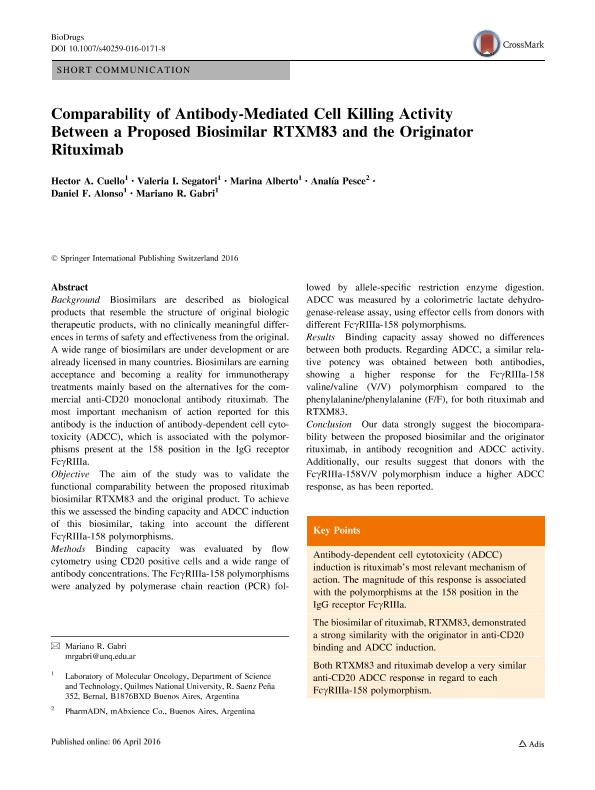Mostrar el registro sencillo del ítem
dc.contributor.author
Cuello, Héctor Adrián

dc.contributor.author
Segatori, Valeria Inés

dc.contributor.author
Alberto, Marina

dc.contributor.author
Pesce, Analía
dc.contributor.author
Alonso, Daniel Fernando

dc.contributor.author
Gabri, Mariano Rolando

dc.date.available
2018-05-28T20:13:46Z
dc.date.issued
2016-06
dc.identifier.citation
Cuello, Héctor Adrián; Segatori, Valeria Inés; Alberto, Marina; Pesce, Analía; Alonso, Daniel Fernando; et al.; Comparability of Antibody-Mediated Cell Killing Activity Between a Proposed Biosimilar RTXM83 and the Originator Rituximab; Adis Int Ltd; Biodrugs; 30; 3; 6-2016; 225-231
dc.identifier.issn
1173-8804
dc.identifier.uri
http://hdl.handle.net/11336/46329
dc.description.abstract
BACKGROUND:Biosimilars are described as biological products that resemble the structure of original biologic therapeutic products, with no clinically meaningful differences in terms of safety and effectiveness from the original. A wide range of biosimilars are under development or are already licensed in many countries. Biosimilars are earning acceptance and becoming a reality for immunotherapy treatments mainly based on the alternatives for the commercial anti-CD20 monoclonal antibody rituximab. The most important mechanism of action reported for this antibody is the induction of antibody-dependent cell cytotoxicity (ADCC), which is associated with the polymorphisms present at the 158 position in the IgG receptor FcγRIIIa.OBJECTIVE:The aim of the study was to validate the functional comparability between the proposed rituximab biosimilar RTXM83 and the original product. To achieve this we assessed the binding capacity and ADCC induction of this biosimilar, taking into account the different FcγRIIIa-158 polymorphisms.METHODS:Binding capacity was evaluated by flow cytometry using CD20 positive cells and a wide range of antibody concentrations. The FcγRIIIa-158 polymorphisms were analyzed by polymerase chain reaction (PCR) followed by allele-specific restriction enzyme digestion. ADCC was measured by a colorimetric lactate dehydrogenase-release assay, using effector cells from donors with different FcγRIIIa-158 polymorphisms.RESULTS:Binding capacity assay showed no differences between both products. Regarding ADCC, a similar relative potency was obtained between both antibodies, showing a higher response for the FcγRIIIa-158 valine/valine (V/V) polymorphism compared to the phenylalanine/phenylalanine (F/F), for both rituximab and RTXM83.CONCLUSION:Our data strongly suggest the biocomparability between the proposed biosimilar and the originator rituximab, in antibody recognition and ADCC activity. Additionally, our results suggest that donors with the FcγRIIIa-158V/V polymorphism induce a higher ADCC response, as has been reported.
dc.format
application/pdf
dc.language.iso
eng
dc.publisher
Adis Int Ltd

dc.rights
info:eu-repo/semantics/openAccess
dc.rights.uri
https://creativecommons.org/licenses/by-nc-sa/2.5/ar/
dc.subject
Cd20 Positive Cell
dc.subject
Reference Product
dc.subject
Flow Cytometry Assay
dc.subject
Patent Expiration
dc.subject
Adcc Activity
dc.subject.classification
Farmacología y Farmacia

dc.subject.classification
Medicina Básica

dc.subject.classification
CIENCIAS MÉDICAS Y DE LA SALUD

dc.title
Comparability of Antibody-Mediated Cell Killing Activity Between a Proposed Biosimilar RTXM83 and the Originator Rituximab
dc.type
info:eu-repo/semantics/article
dc.type
info:ar-repo/semantics/artículo
dc.type
info:eu-repo/semantics/publishedVersion
dc.date.updated
2018-05-28T14:47:57Z
dc.journal.volume
30
dc.journal.number
3
dc.journal.pagination
225-231
dc.journal.pais
Nueva Zelanda

dc.journal.ciudad
Auckland
dc.description.fil
Fil: Cuello, Héctor Adrián. Universidad Nacional de Quilmes. Departamento de Ciencia y Tecnología. Laboratorio de Oncología Molecular; Argentina
dc.description.fil
Fil: Segatori, Valeria Inés. Consejo Nacional de Investigaciones Científicas y Técnicas; Argentina. Universidad Nacional de Quilmes. Departamento de Ciencia y Tecnología. Laboratorio de Oncología Molecular; Argentina
dc.description.fil
Fil: Alberto, Marina. Universidad Nacional de Quilmes. Departamento de Ciencia y Tecnología. Laboratorio de Oncología Molecular; Argentina
dc.description.fil
Fil: Pesce, Analía. PharmADN; Argentina
dc.description.fil
Fil: Alonso, Daniel Fernando. Consejo Nacional de Investigaciones Científicas y Técnicas; Argentina. Universidad Nacional de Quilmes. Departamento de Ciencia y Tecnología. Laboratorio de Oncología Molecular; Argentina
dc.description.fil
Fil: Gabri, Mariano Rolando. Consejo Nacional de Investigaciones Científicas y Técnicas; Argentina. Universidad Nacional de Quilmes. Departamento de Ciencia y Tecnología. Laboratorio de Oncología Molecular; Argentina
dc.journal.title
Biodrugs

dc.relation.alternativeid
info:eu-repo/semantics/altIdentifier/doi/https://dx.doi.org/10.1007/s40259-016-0171-8
dc.relation.alternativeid
info:eu-repo/semantics/altIdentifier/url/https://link.springer.com/article/10.1007%2Fs40259-016-0171-8
Archivos asociados
